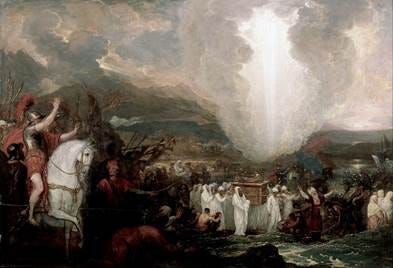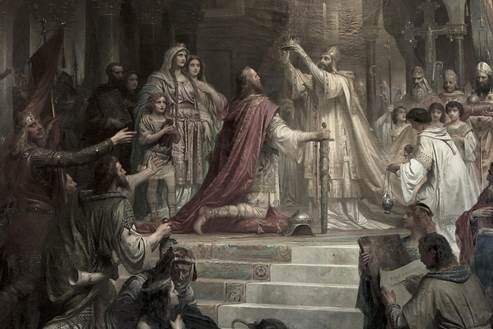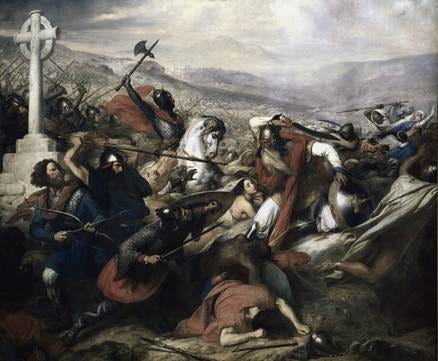Citizens vs. Foreigners: A Saint's Perspective
Thomas Aquinas on Immigration and the Common Good
In his Summa Theologiae, St. Thomas Aquinas writes that “Man’s relations with foreigners are twofold, peaceful and hostile, and in directing both kinds of relation the Law contained suitable precepts.”
The saint, therefore, does not treat the topic of immigration in modern overly-simplistic terms. Instead, his political theology offers a practical and perennial framework for discerning the relationship between the nation and those whom he refers to as “strangers” and “foreigners”.
So what does the great saint have to teach us about the modern immigration debate?
Reminder: you can get tons of useful members-only content and support our mission for a few dollars per month 👇
Two full-length, new articles every single week
Access to the entire archive of useful knowledge that built the West
Get actionable principles from history to help navigate modernity
Support independent, educational content that reaches millions
Law, Prudence, and the Common Good
In his Summa Theologiae, Aquinas’ theory on immigration reflects a Golden Mean between indiscriminate openness and rigid exclusion, thoroughly grounded on the principles of natural and human — or positive — law, the common good (bonum commune), and order of charity (ordo caritatis), fostering peace and the conditions for virtuous life.
Because particular circumstances differ, those entrusted with authority must exercise prudence in applying these universal principles to particular examples. As a result, immigration — whether as a matter of entry, temporary residence, or permanent citizenship — falls under the realm of prudential judgment. It is never an absolute good or an absolute threat, but must be judged according to whether it serves the common good and the peace of the nation to which the sovereign owes their primary obligations to protect.
The Old Law as a Political Framework
Aquinas’s most explicit treatment of immigration appears in his discussion of the Old Law’s judicial precepts. He observes that Mosaic law distinguished among kinds of “strangers” and “foreigners” and regulated their relation to the people of Israel with both hospitality and caution.
He outlines three classifications. The first included travelers and temporary sojourners were to be treated with justice and compassion — as the Israelites knew the condition of being a stranger in foreign lands. The second were the foreigners who sought to temporarily reside among the people. He adds that these were not immediately admitted to full civic participation. In this instance, naturalization or citizenship was not an inherent right but a gradual process reserved for those who shared a cultural and religious affinity with the nation. These foreigners who desired to be welcomed into their “mode of worship” were received into fellowship only “after the third generation”. The third were those who “had no fellowship of kindred” with the Israelites, and on account of historic conflicts were to be “held as foes in perpetuity”.
Such exclusions, Aquinas insists, were not born of racial hatred but of political prudence. Aquinas affirms that “the reason for this was that if foreigners were allowed to meddle with the affairs of a nation as soon as they settled down in its midst, many dangers might occur, since the foreigners not yet having the common good firmly at heart might attempt something hurtful to the people”.
In the Exodus account, Sacred Scripture records that a “mixed multitude” departed Egypt alongside the Israelites — referring to those Egyptians who, moved by divine signs and the justice of Israel’s cause, sought fellowship with the people of God.
Their inclusion reflects the principle that political and spiritual incorporation must be governed by prudence, charity, and the common good. These Egyptians, having freely chosen to align themselves with Israel’s worship and law, exemplify the gradual assimilation Aquinas commends: one rooted not in mere proximity, but in shared moral and religious order, and their reception by the Israelites affirms that “strangers” may be welcomed into fellowship when their intentions harmonize with the ends of peace, virtue, and rightly ordered community.
The Order of Charity
It is for this that the gift of charity is bestowed by God on each one, namely, that he may first of all direct his mind to God, and this pertains to a man’s love for himself, and that, in the second place, he may wish other things to be directed to God, and even work for that end according to his capacity.
– St Thomas Aquinas (Summa Theologiae)
In Thomistic thought, the order of charity is the divinely ordained hierarchy that directs each one of us to love God above all, then ourselves rightly, then those bound to us by closest duty and proximity — namely, family, neighbors, and fellow citizens — before extending outward to all humanity.
This order of charity does not license indifference to the “stranger” — as charity extends even to our enemies — but structures priorities so that universal charity does not dissolve tangible obligations to the community that depends on us.
The order of charity is encapsulated in the old maxim that “charity begins at home”. A father’s primary obligation is to provide for and protect his own immediate family — namely, his wife and children. The father’s secondary or mediate obligation is to his extended family or kinsmen and neighbors, as he is somewhat responsible for their wellbeing, and their wellbeing impacts the common good which indirectly affects his family. The father’s tertiary or remote obligation is to his wider community or state. This order of charity is — as the name suggests — the right ordering of one’s obligations, and the desire to invert or distort this hierarchy is — by definition — disordered.
Acts of charity such as corporal mercy includes welcoming the “stranger” and providing material aid to those who require it. In cases of urgent necessity – when life or basic human dignity is at stake — we are bound to assist, even if the person is not of our household or community. Yet assistance is also ordered, namely, we have an obligation to assist those closer to us by duty and relationship, and we give according to our means so as not to compromise the care of others entrusted to us.
This dual emphasis guards against two excesses. The first is the refusal to assist the other on the grounds that they share no relation to you and are effectively “strangers”, which violates the universality of charity. The other is an indiscriminate and disproportionate generosity that neglects the particular debts owed to one’s own family and nation for the sake of the other, undermining the very order in which charity should flourish.
Political friendship, peace, and Assimilation
Aquinas understands political community as a form of friendship ordered to shared life under just laws. Peace is not simply the absence of conflict but the tranquility of order (tranquillitas ordinis), sustained by concord about the ends and norms of common life. The admission of “strangers” must be evaluated by its impact on this order: whether it strengthens the community’s capacity for virtuous living or strains the bonds that make civic friendship possible. Furthermore, admission must always be proportionate as the integration of whole peoples would threaten the cohesion of the existing nation. In more practical terms, if the nation were to absorb a disproportionate number of peoples into its borders, it would inevitably and irreversibly alter the culture, language, and religion of the nation.
In this Thomistic sense, assimilation can only be accomplished by the “stranger” willing to join in fellowship of the nation, to uphold its cultural values and laws, to participate in its civic responsibilities, and commitment to the nation’s common good. In exchange, the nation must exercise charity to those who seek to be welcomed into fellowship and mode of worship, integrating them in ways that genuinely serve the common good rather than exploiting them for political or economic gain.
A Thomistic Balance
Upon closer examination, it is evident that Aquinas’s argument provides a remedy to modern excesses. He firmly rejects the notion that borders are arbitrary, firmly maintaining national sovereignty and the exercise of just political authority. However, he also rejects the notion that borders absolve us of the moral responsibility to assist those in need as Christian charity is both universal and binding — within reason.
In summation, Aquinas argues that Christians are bound to extend hospitality to the stranger, safeguard civic peace through prudent and gradual integration, and remain vigilant against arrangements that threaten the integrity of the nation. This duty rests upon the order of charity wherein we owe more to those united to us by nature or obligation — so long as such preferential charity remains subject to justice and does not negate the universal love due to all persons, who are similarly made in the image and likeness of God.
However, Aquinas affirms that when a nation is assailed by unjust aggression – where its territorial integrity and sovereignty are violated — recourse to just war becomes not merely permissible but a moral obligation, insofar as it serves the defense of peace, justice, and the common good. Such action must be governed by right intention, legitimate authority, and proportional means, lest the remedy itself transgress the bounds of virtue.
Patriotism and the Moral Measure of Immigration
Man is debtor chiefly to his parents and his country, after God. Wherefore just as it belongs to religion to give worship to God, so does it belong to piety, in the second place, to give worship to one’s parents and one’s country.
– St Thomas Aquinas (Summa Theologiae)
The love of country belongs to the order of charity, which obliges us to seek first the good of our own community while not neglecting the “stranger”. Immigration, therefore, is a contingent good, to be judged by reason according to whether it serves peace, virtue, and the common good; whether it safeguards those to whom the nation owes its first care; and whether it integrates newcomers into civic friendship under just laws.
It is fitting only when animated by true patriotism as an expression of the virtue of justice, proportionate to a society’s capacity, and ordered to the unity and flourishing of the individual and the whole.











Excellent and timely article. Thank you.
A real tour de force, amazing. I must read more of Aquinas' works. Thank you Imperator this was one of the finest essays I've ever read.
All my life, nationalistic sentiment, the idea of sacrifice and service to Canada, and to the Motherland France and Scotland and my adoptive home of my twenties Japan has always run strong in me. I just never had a term for the philosophy the notions that permeated my being; thomistic thought. What is more is that simply being Nationalistic, being a lover of your homeland, of your fatherland or motherland need not mean you hate other nations. It is about love, charity and after a fashion chastity. Treating the nation akin to how one would one's spouse or parent, and wishing to do everything to assist them and serve them.
God wants us to love our homes, to care for our Christian brothers and to forgive their wrongs. He also wants us to remember that service to the homeland brings us closer to him not farther.